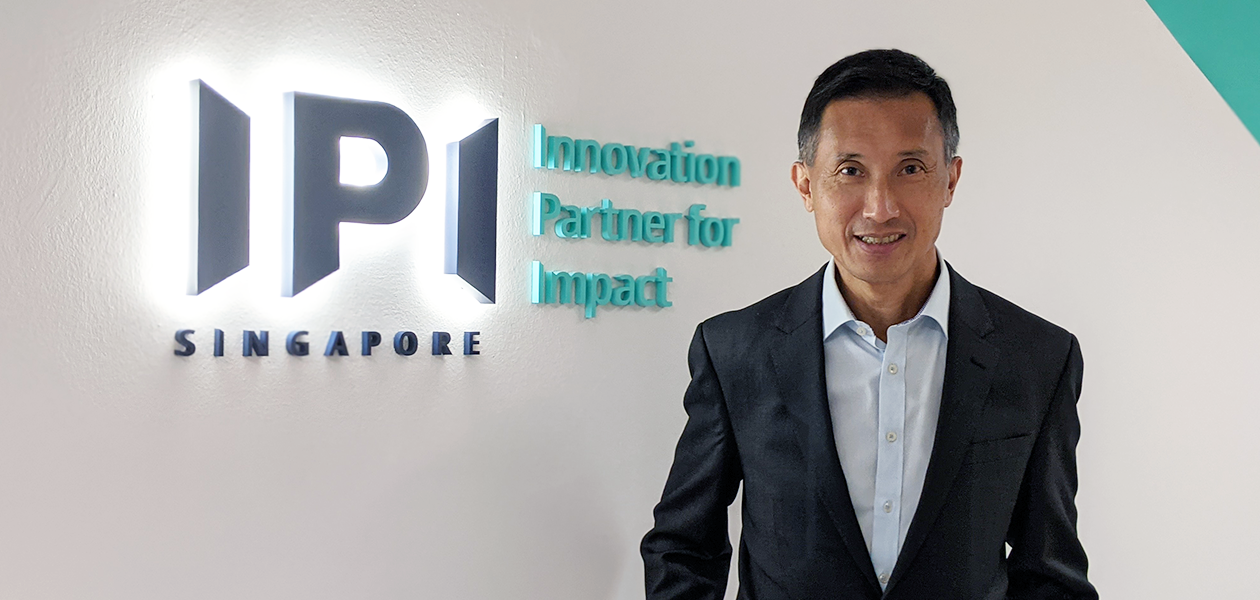How IPI fosters innovation through partnerships
IPI’s refreshed identity reflects its proactive role in empowering enterprises to thrive through innovation, according to IPI CEO Wong Lup Wai.
In the fast-paced world of business, one common—if cutthroat—saying goes: innovate or die. As sensational as the phrase may be, the coronavirus pandemic has all but confirmed the accuracy of those three words. With the widespread upheaval caused by COVID-19, enterprises—both big and small—have been forced to quickly adapt and even embrace innovation in hopes of staying afloat.
Wong Lup Wai, Chief Executive Officer of IPI, is all too familiar with the constant need for innovation having held senior management positions in innovative companies like Philips before taking up the mantle as IPI CEO in September 2019.
Recognising the support needed by companies as they embark on their innovation journeys, IPI recently revealed its new brand identity as Innovation Partner for Impact at the opening of its flagship Technology brokerage event TechInnovation 2020. Officially announced on 7 December by Dr Tan See Leng, Singapore’s Second Minister for Trade and Industry, IPI’s refreshed identity reflects its evolving mission to go beyond its initial role as an intermediary. As an innovation catalyst, IPI is set to provide holistic end-to-end support to enterprises, from ideation to product development and eventually, commercialisation.
A track record of innovation
Since its establishment in 2011, IPI has continuously championed the growth of local businesses in various industries. One of the many ways IPI does so is by matching homegrown enterprises with technology partners and experts across the globe through its innovation marketplace.
“IPI provides a neutral platform to bring these technology offers and needs under one roof, creating transparency and providing convenience to the technology seekers and providers,” Wong explained. “In a way, it also levels the playing field as organisations are left anonymous and the technology is assessed purely on a demand or industry-driven basis.”
Indeed, over the past decade, IPI has facilitated over 200 technology matches that have resulted in new products successfully brought to market as well as enhanced innovation processes. For Wong, a notable example is Singapore-headquartered Invivo Medical’s surgical assist device for simplifying kidney stone removal surgery, which came about from a serendipitous match-up at TechInnovation 2013.
The device was first developed by a team from the Institute of Technical Education (ITE), who were subsequently matched with Invivo Medical to commercialise the device. Following further development with other partners, the External Assist Targeting Device (EATD) is now available on the market.
The shifting sands of innovation
Having led IPI for over a year now, Wong has certainly noticed a sea change in the innovation landscape. “There’s a changing mindset, with more people now open to collaboration,” he shared. “We’ve seen more collaborations, particularly innovation calls, over the years.”
In the last financial year alone, for instance, IPI organised five innovation challenges—rallying the international innovation community to solve 105 problem statements from over 35 corporate partners. IPI’s efforts garnered more than 400 proposals from over 290 small and medium enterprises (SMEs) and start-ups.
Another new offering from IPI is the Innovation Advisors Programme in partnership with Enterprise Singapore, which empowers SMEs to gain relevant insights from senior industry veterans. In the process, the programme allows SMEs to strengthen their capabilities in leveraging technology and innovation to address market needs. Since the programme’s launch in late 2019, over 15 enterprises have been onboarded.
Going beyond boundaries in 2021
As CEO of IPI, Wong’s top priority over the next years is to create more opportunities for enterprises to grow beyond boundaries—and with IPI as an Innovation Partner for Impact, there will surely be numerous opportunities for growth.
For instance, IPI’s open innovation services help enterprises identify partnership opportunities that best meet their needs, while the innovation advisors can help them advance their capabilities. Enterprises can also stay informed of the latest enabling technologies beyond their network through the innovation marketplace, and leverage IPI’s global innovation ecosystem to explore cross-border collaboration. Finally, IPI’s emerging technology forums, innovation workshops and white papers can unlock new insights for industry players.
Daring to dream bigger, IPI is also set to engage 1,600 more enterprises over the next five years, with the ambitious aim of increasing technology matches by 60 percent. Not only will IPI deepen its engagement with industry clusters like electronics, healthcare and food manufacturing, it will also expand to other sectors like logistics, construction and agritech.
As exciting as this may all seem, nothing is truly set in stone in a post-COVID world. Enterprises in Singapore, however, can rest easy knowing that with Wong at the helm, IPI is dedicated to supporting innovation from start to finish.

